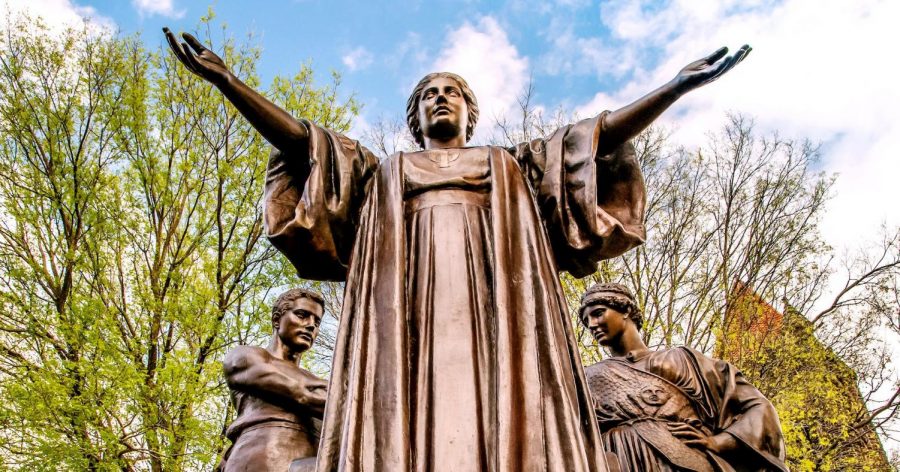Graduate applicants face uncertainty over credit/no credit grades
Photo Courtesy of The Graduate College at Illinois
The Alma Mater statue stands on the corner of Green and Wright streets on a spring day. The Graduate College is expecting an increase of applicants with credit/no credit grades in their transcripts.
Feb 25, 2021
As the pandemic persists into its second year, the University, like many other universities across the country, has adopted alternative academic policies to help alleviate the struggles of remote learning.
However, some University officials have expressed concern over the potential impacts that these policies may have on students in the future, such as how they might affect graduate or professional school applications.
The Law School Admissions Council, an organization that administers the LSAT and facilitates law school applications, will not calculate an undergraduate GPA for applicants with more than 60 non-graded credit hours.
“There’s not going to be a reportable GPA and for most students, I think that would not be a good thing,” said Rebecca Ray, assistant dean for Admissions and Financial Aid at the College of Law.
This includes transfer credits such as AP or IB credits as well as grades reported as credit/no credit.
Get The Daily Illini in your inbox!
“For students who have opted for CR/NC already in the COVID era and also may have a lot of AP or advanced college credit from high school, they may already be approaching that 60 credit hour threshold,” Ray said.
While law schools will still have access to an applicant’s transcript, they will not be given an undergraduate GPA for that applicant.
“Obviously we’re gonna dig into the actual transcripts and look at what grades you did get, but it sort of takes away from that summarization of your entire undergraduate career,” Ray said. “The LSAT becomes a little bit more important in those instances.”
If an applicant has less than 60 non-graded credit hours, grades reported as ‘NC’ or No Pass will be considered an F grade by the LSAC when calculating an applicant’s undergraduate GPA, while grades given as ‘CR’ or Pass will not be used in GPA calculations.
“For some reason, if you’re going to end up with a ‘No Credit’ and it’s going to get counted as an F, you want to think very carefully about that,” Ray said.
The LSAC is planning to include a letter in the applications of students who were enrolled in the Spring 2020 Semester that notes the disruptions COVID-19 caused during that semester.
For medical school applications, the American Medical College Application Service, has issued a guide on how they will handle COVID-19-related grading policies.
“Binary non-qualitative grades” such as CR/NC will not be counted towards an applicant’s AMCAS GPA, according to the guide.
The AMCAS will instead count them as “Supplemental Hours” unless they are provided an “alpha grade conversion” by the applicant’s university.
Despite this, “not all medical schools are taking the same approach to pass/no pass,” said Nora Few, director of admissions in the College of Medicine.
“The vast majority are being more flexible than they were pre-COVID,” Few said in an email. “But how far they are going varies. Some schools will not accept pass/no pass for pre-requisites, for example.”
While students applying to medical school or law school usually do so through a centralized process, prospective graduate students generally apply directly to graduate schools.
The University’s Graduate College said that it will not penalize applicants who have adopted CR/NC or Pass/No Pass grading and that more focus will be given to students’ academic records prior to and potentially after the pandemic.
Still, the Graduate College is expecting to see more applicants with CR/NC grades as a result of the pandemic, according to Charlotte Bauer, assistant dean for Communications and Strategic Planning at the Graduate College.
“With the pandemic, we do expect to see an increased number of applications with Pass/Fail or Credit/No Credit grades and have advised our graduate programs to continue to review applications holistically,” Bauer said in an email.






